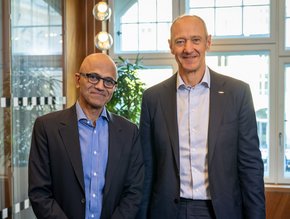Phos supports Europe’s economy via Mastercard partnership

Phos - the organisation behind the first software point of sale (POS) - has announced the extension of its partnership with Mastercard.
The extension will see Phos introduce Mastercard’s innovative mobile payments solutions in 12 European countries.
As a result 12,000 small businesses will be able to accept contactless payments via Android mobile devices. This capability will allow merchants to digitalise their payment process and provide more payment options for their customers, and is expected to drive growth.
This extension follows the success of the original pilot scheme in the UK, Germany, Romania and Bulgaria. The new phase will support significant growth in existing markets, as well as driving growth in new markets including: France, Belgium, Greece, Italy, the Netherlands, Poland, Portugal and Spain.
As part of this phase the partnership will support micro, small and medium enterprises (MSMEs) across Europe as they begin to reopen and look for ways to attract new customers.
Access to this technology solution will help Phos to streamline payment processes and avoid common acceptance issues, driving quicker and effective contactless payments, as well as fast access to their money.
The project between Phos and Mastercard will rely on Paynetics - an e-money institution with license in the European Union - as the acquiring bank, and will partner with merchants in the participating countries to refinine its innovative POS solution.
With 33mn businesses in Europe still reliant on cash, despite the increase in demand for safe and sustainable alternatives, this growth in mobile phone ownership and contactless transactions is helping to overcome the cost barrier many are facing.
“Our ongoing partnership with Mastercard brings next-gen payment technology to those financially underserved merchants who want to maximise the sales potential of their customer base, and is particularly pertinent as they get back up and running post-lockdown. With a proven and credible technology solution behind us, we have purposefully built a solid network across the European region that we can use to support those businesses, for who we expect significantly increased sales. The support we are getting from the team at Mastercard on both a global and local scale will allow us to help even more businesses expand their portfolio of payment options over the coming months,” commented Brad Hyett, CEO of phos.
“Small businesses form the backbone of the European economy; enabling them to accept digital payments isn’t only more convenient and secure, but it’s also essential for them to operate in the new normal. As Mastercard, we are delighted to extend our partnership with phos to empower small businesses to offer more payment options as they open their doors post lockdown,” added Jason Lane, EVP, Market Development Europe at Mastercard.
For more information on business topics in Europe, Middle East and Africa please take a look at the latest edition of Business Chief EMEA.
- Interview: Manuel Sandhofer, SVP and GM Europe at NiumLeadership & Strategy
- MENA Fintech Association builds on booming Africa marketsTechnology
- Exclusive: Nameer Khan, Chairman of MENA Fintech AssociationLeadership & Strategy
- Top 10 startups to watch in 2023: Middle East & North AfricaLeadership & Strategy






